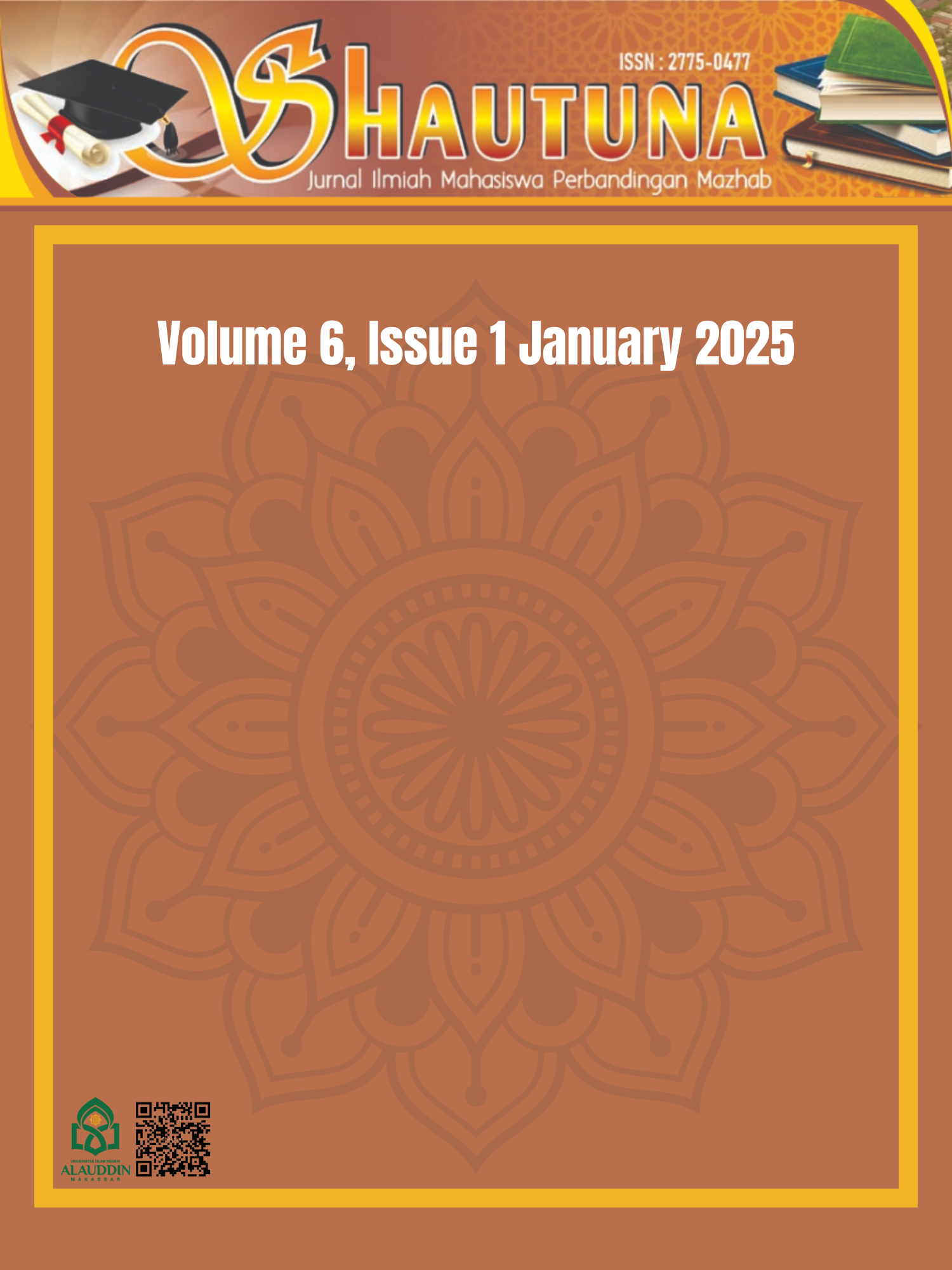Chemical Castration as a Sanction for Pedophilia Offenders
An Examination of Maqasid Sharia and the Principle of Human Rights Non-Discrimination
DOI:
https://doi.org/10.24252/shautuna.v6i1.53185Keywords:
Chemical Castration, Pedophilia Offenders, Maqasid Sharia, Human Rights Non-DiscriminationAbstract
The purpose of this study is to evaluate the extent to which chemical castration is effective in providing a deterrent effect, analyze the argumentative basis of this punishment as a form of prevention, and assess its conformity with the principles of human rights and Islamic criminal law. This article examines the application of chemical castration punishment to perpetrators of sexual crimes, especially pedophilia, through the perspective of Human Rights (HAM) and Islamic criminal law. The background of this study is based on the increasing cases of sexual violence in Indonesia which encourages the government to adopt chemical castration as a repressive and preventive effort. This research uses a literature study method with an exploratory-qualitative approach. Data were collected through document analysis, positive legal literature, international provisions related to human rights, as well as authoritative sources in classical and contemporary Islamic law. The analysis was carried out normatively and descriptive-critically. The results of the study show that chemical castration punishment causes controversy from various aspects, both medically, psychologically, socially, and legally. From a human rights perspective, this action is seen as a form of treatment that degrades human dignity and has the potential to violate the principle of non-derogable rights related to physical and mental integrity. Meanwhile, from the perspective of Islamic criminal law, although there is a principle of prevention ('sadd al-dzari'ah') against crime, there is no explicit legitimacy that allows invasive medical measures such as chemical castration, which can be categorized as a form of mutilation and is not in line with maqāṣid al-syarī'ah in safeguarding body and soul (ḥifẓ al-nafs wa al-'irḍ). This study confirms that chemical castration punishment cannot be used as a substantial and comprehensive solution to the problem of sexual crime, because it does not touch the structural or cultural roots of the problem.
References
Ambarwaty, Dwitya. “Analisis Kritis Penerapan Kebiri Kimia Terhadap Pelaku Kejahatan Seksual Terhadap Anak.” Syntax Idea 6, no. 11 (2024): 6784–87. https://doi.org/10.46799/syntax-idea.v6i11.10120.
bbc.com. “Kebiri Kimia: Hanya Untuk Tekan ‘libido’ Denga Biaya Tinggi, Sementara Korban Dikesampingkan,” 2021.
DA, Ady Thea. “Hukuman Kebiri Kimia Dinilai Tak Efektif Beri Efek Jera.” hukum online.com, 2019.
Daming, Saharuddin. “Mengkaji Pidana Kebiri Kimia Dalam Perspektif Medis, Hukum Dan Ham.” Supremasi Hukum: Jurnal Kajian Ilmu Hukum 9, no. 1 (July 9, 2020): 22–29. https://doi.org/10.14421/sh.v9i1.1803.
Dhestiana, Nurrida. “Islam Dan Hak Asasi Manusia (HAM) Dalam Perspektif Fathi Osman.” Al Yasini : Jurnal Keislaman, Sosial, Hukum Dan Pendidikan 3, no. 2 (November 15, 2018): 84–95. https://ejournal.kopertais4.or.id/tapalkuda/index.php/alyasini/article/view/3508.
Hadi, Fikri. “Negara Hukum Dan Hak Asasi Manusia Di Indonesia.” Wijaya Putra Law Review 1, no. 2 (2022): 170–88. https://doi.org/10.38156/wplr.v1i2.79.
Hafrida, Hafrida. “Pro Kontra Sanksi Kebiri Kimia : Sanksi Yang Progresif Atsu Primitif?” Indonesia Criminal Law Review 1, no. 1 (2021): 12–24. https://scholarhub.ui.ac.id/iclr/vol1/iss1/2/.
Ilyas, Muhammad, and Ayu Dewi Maharani. “Konsep Kepribadian Islam Menurut Taqiyuddin An Nabhani.” Jurnal Islamika 2, no. 2 (2019): 132–43. https://www.ejurnal.umri.ac.id/index.php/JSI/article/view/1642.
Iman, Afzal Nur. “Komnas PA: 2.793 Anak Jadi Korban Kekerasan Seks, Pelaku Orang Terdekat.” Detik Jateng, July 2023.
Imran, Warda. “How Effective a Punishment Is ‘Chemical Castration’?” DW.com, 2021.
Khurniawan, M Arnanda. “Perlindungan Hukum Terhadap Korban Tindak Pidana Pelecehan Seksual Terhadap Anak-Anak Oleh Unit Pelaksana Teknis Daerah Perlindungan Perempuan Dan Anak Di Kota Jambi.” Universitas BATANGHARI Jambi, 2023.
Lestari, Herminiastuti. “Sanksi Bagi Mantan Terpidana Kejahatan Seksual Pada Anak.” JHPIS: Jurnal Hukum, Politik Dan Ilmu Sosial 1, no. 1 (2022): 300–315. https://doi.org/10.55606/jhpis.v1i1.1755.
Marbun, Paulina, and Jadmiko Anom Husodo. “Hukuman Kebiri Bagi Pelaku Pedofilia Dalam Perspektif Hak Asasi Manusia.” Res Publica 5, no. 1 (2021): 86–97. https://doi.org/10.20961/respublica.v5i1.58447.
Mardiya, Nuzul Qur’aini. “Penerapan Hukuman Kebiri Kimia Bagi Pelaku Kekerasan Seksual.” Jurnal Konstitusi 14, no. 1 (July 24, 2017): 213–33. https://doi.org/10.31078/jk14110.
Markus. “IDI Menolak, Dokter Polisi Yang Bertindak.” Persatuan Gereja Indonesia, 2016.
Online, Tim Hukum. “Perbedaaan Upaya Preventif Dan Represif Beserta Contohnya.” hukumonline.com, 2024.
Patra, Rommy. “Perlindungan Hak Konstitusional Untuk Bebas Dari Penyiksaan Di Indonesia.” Jurnal Konstitusi 15, no. 3 (November 19, 2018): 565–91. https://doi.org/10.31078/jk1536.
Perempuan, Komisi Nasional. “Catatan Tahunan Komisi Nasional Perempuan,” 2024.
Republik Indonesia. Keputusan Presiden No. 36 tahun 1990 tentang Pengesahan Convention on the Rights of the Child (Konvensi tentang Hak-hak Anak), Pub. L. No. 36, 1 (1990).
———. Undang-undang Republik Indonesia Nomor 70 Tahun 2020 Tentang Tata Cara Pelaksanaan Tindakan Kebiri Kimta, Pemasangan Alat Pendeteksi Elektronik, Rehabilitasi, Dan Pengumuman Identitas Pelaku Kekerasan Seksual Terhadap Anak, Pub. L. No. 70, 1 (2020).
Republika.com. “Dokter Rumah Sakit Polri Siap Jadi Eksekutor Kebiri.” Republika.com, 2021.
Saadah, Nazla Aulia, and Putri Maharani Rahma Aisah. “Penegakan Hukum Kebiri Kimia Di Indonesia: Peran Infrastruktur Hukum Dalam Implementasinya.” Posita: Jurnal Hukum Keluarga Islam 1, no. 2 (2023): 58–71. https://doi.org/10.52029/pjhki.v1i2.162.
Sari, Desi Puspita, Siti Ayu Resa Purwati, Muhammad Fadly Darmawan, Muhammad Syahrul Maulana, Irfan Maulana, and Herli Antoni. “Perlindungan Hukum Bagi Korban Pelecehan Seksual Menurut Prespektif Undang-Undang Nomor 12 Tahun 2022 Tentang Tindak Pidana Kekerasan Seksual.” Al-Qisth Law Review 7, no. 1 (2023): 65–87. https://doi.org/10.24853/al-qisth.7.1.65-87.
Vience Ratna Multiwijaya, and Ermania Widjajanti. “Jerat Hukum Kebiri Pelaku Korban Kekerasan Seksual Pada Anak.” Collegium Studiosum Journal 6, no. 1 (June 30, 2023): 200–214. https://doi.org/10.56301/csj.v6i1.878.
Wahyudi, Endik, and Gerry Gerry Joe. “Kebijakan Formulasi Sanksi Kebiri Kimia Di Indonesia Di Tinjau Dari Peraturan Pemerintah Pengganti Undang-Undang Nomor 1 Tahun 2016 Tentang Perlindungan Anak.” MIMBAR YUSTITIA : Jurnal Hukum Dan Hak Asasi Manusia 3, no. 2 (December 30, 2019): 145–64. https://doi.org/10.52166/mimbar.v3i2.2306.
Widianto, Amodra Mahardika Putra, and Aji Lukman Ibrahim. “Sanksi Alternatif Bagi Pelaku Kekerasan Seksual Terhadap Anak Yang Tidak Layak Dikenakan Tindakan Kebiri Kimia.” Al Qalam: Jurnal Ilmiah Keagamaan Dan Kemasyarakatan 17, no. 3 (2023): 1715–37. https://doi.org/10.35931/aq.v17i3.2128.
Winda Destiana, Putri; “RS Jerman Jalankan Terapi Untuk Cegah Pedofilia,” n.d.
Downloads
Published
How to Cite
Issue
Section
License
Copyright (c) 2025 Nurul Rezeki Atifah, Marilang Marilang, Hamsir Hamsir

This work is licensed under a Creative Commons Attribution 4.0 International License.









